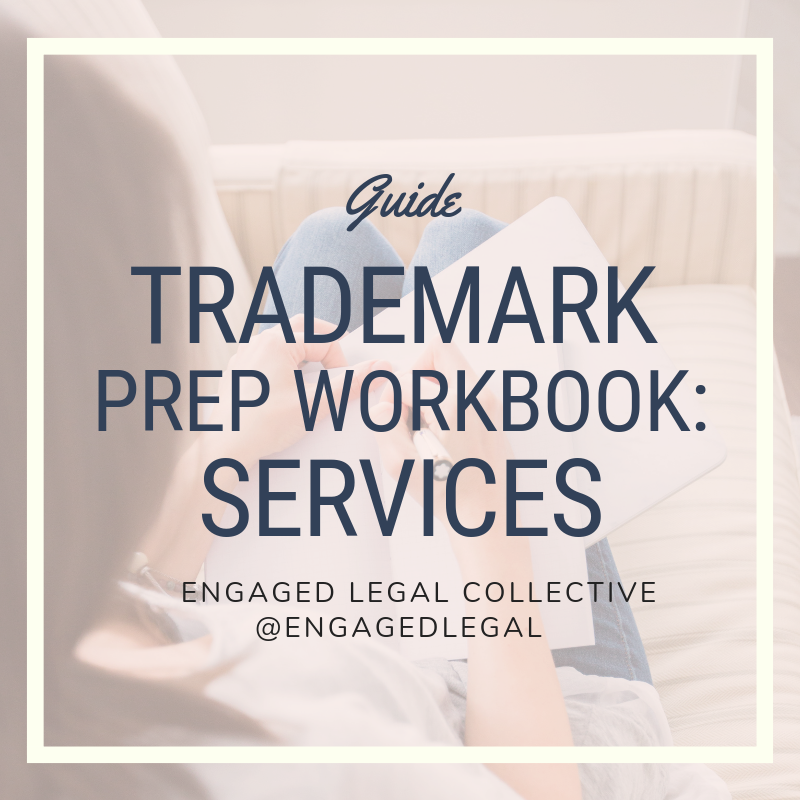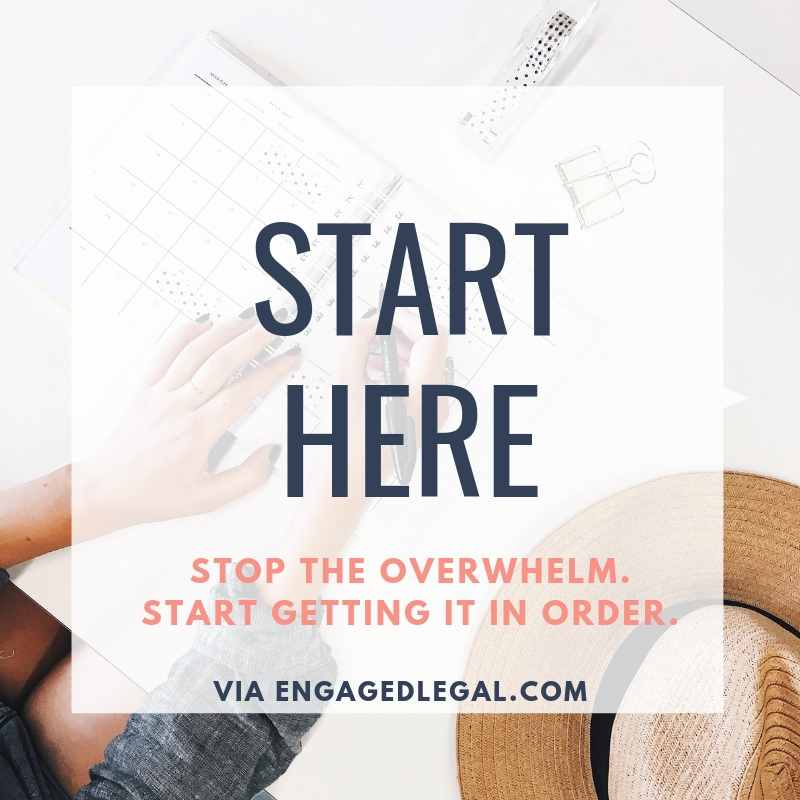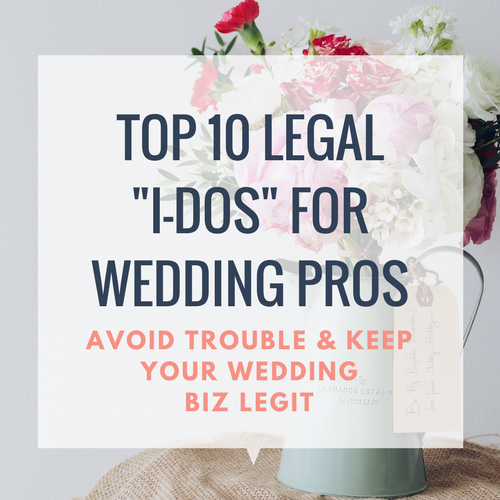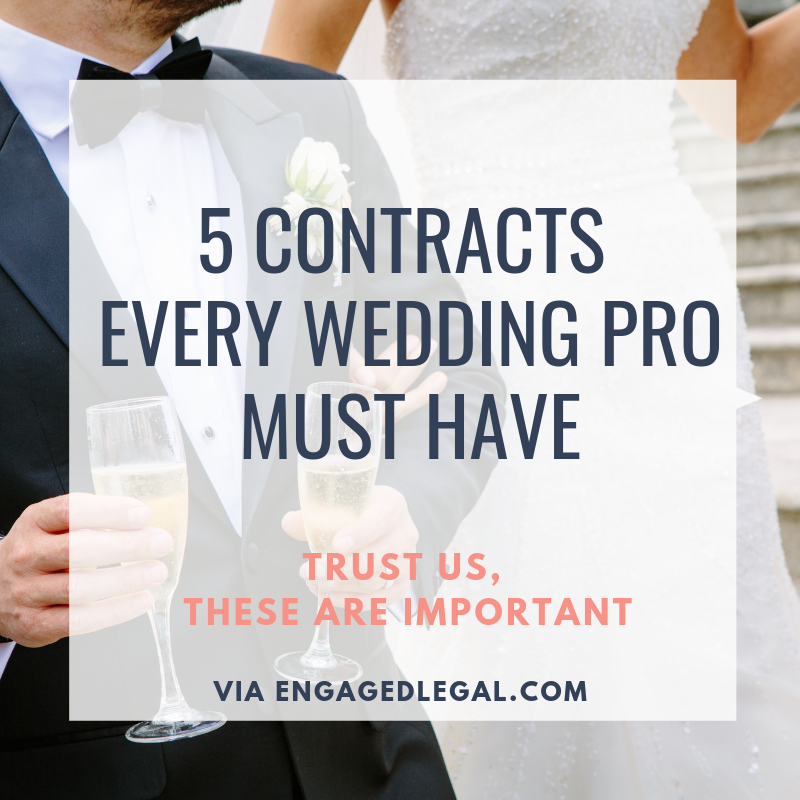Simplified: Trademarks for Wedding & Event Pros
/(Found us through our Honeybook article? WELCOME! Glad you’re here!)
You’ve probably heard through the grapevine how important it can be to register your business name as a trademark. But why? What is a trademark? Why is it important? And do you really need to do it?
Like most things, there are few easy answers. But don’t worry— we wrote you this simplified primer to give you the down-low on trademarks and why it’s critical you’re familiar with them.
First off, What is a Trademark?
A trademark is a source indicator. It indicates who made a specific thing, (the “swoosh” means it’s from Nike) where something comes from, (Champagne is only from a region in France, who knew?!) lets you know some sort of qualities about the goods (“leggings with an Underarmor logo are going to be AWESOME”). You know that when you walk into a McDonalds in Ohio, you’re going to have the same experience, branding, service, and style of food as a McDonalds in Rhode Island. It’s not about you—it’s about what the name, slogan, or logo tells a purchaser about a product or service.
What does a trademark do for me?
A trademark allows the “markholder”—the person who registers the mark—to exclusively use the trademark in their category of goods and services. You DON’T get a blanket right to use the term entirely in every type of business. You DO get a right to be the sole user in your “Class,” meaning the category or categories you pay for and register in. That means if you are “Starstruck Wedding and Events” and someone starts calling themselves “Starstruck Weddings,” you’re entitled to send them a cease and desist/ sue them for infringement.
How do you get trademark protection?
There are few things we have to talk about before deciding if you can trademark your name, slogan, or logo. First, we have to make sure it’s “trademarkable,” a word I just made up meaning “it can actually be protected.” Let’s talk about the different things that can’t be protected:
First, we have to make sure someone else hasn’t registered it. We evaluate trademarks based on sight, sound, and meaning, and there is no easy way to do this using the USPTO system. Now, it’s easy enough to do a quick “direct hit” search of the USPTO’s system, but that’s only about a third of the research you need to do. The USPTO system is really, really limited. It’s also really, really confusing, with lots of numbers and letters and Classes and subclasses—it’s a hot mess express in there. (Go ahead and try a search and you’ll see exactly what I mean. I’ll wait right here.)
You need to know how to get in there and evaluate marks that are similar, marks that are interpreted the same way, and marks that could be construed as “confusing”—because these, my friends, will get you rejected. And guess what? Even a direct hit on your trademark might not bar you from using that trademark.
And this, my friends, is why you hire an attorney. Someone who knows exactly what they are doing in that hot mess. Someone who has spent hours rolling around in this insanity, who has the tools to track things, and who delights in the intricacies of the registration process. I’ll get off my soapbox now.
Moving on!
Second, there are some words or phrases that can never be protected because they are “too generic.” Generic words are terms that are “dictionary” for something: “cat” as pertaining to felines, “grape” as pertaining to the fruit/ flavor, or “consulting” as pertaining to giving business advice. These words aren’t going to be protectable because they are the generic word for a specific term, and blocking anyone else from using them is bananas—because how could we refer to temperamental-furry-four-legged-sassy-animals if we couldn’t say “cats?”
It's also tough to get a trademark for a term that’s descriptive of a good or service, like “Easton Wedding Events and Design” or “Film and Photography Studios.” So while it may be advantageous in SEO or identification for your business to be called “New York Photography,” (for photographers based in New York) that’s not going to be something you can protect with a trademark registration!
Now, you can get a descriptive mark registered by showing you can prove certain things, namely “secondary meaning” of the word or phrase, but that’s a potentially expensive legal argument that will take some convincing of the Trademark Examiners. In my opinion, it’s best to just avoid that fight, if you can.
Finally, and this one might be obvious, but you also can’t get trademarks for something that is misdecriptive of the good or service, e.g. “Maryland Fresh Florals” for a business importing flowers from South America. That’s just rude.
So do I need one?
This question is going to get that big old “that depends!” answer.
More often than not, a wedding and event professional SHOULD get a trademark for their business. Why? Because you all are all over the dang map—literally!
Traditionally, a brick-and-mortar business will be confined to one or two states. But now, with the digital age, we’ve got photographers flying across country to shoot a wedding, planners teaching nationwide courses, and rental companies shipping up and down the East Coast. Businesses have utilized technology to get your names out and about, and it’s an amazing thing. But that puts a LOT of competition out there, and in an industry where image is everything, branding is overlapping like crazy.
And if you’re using a name and someone else registers it before you? You might have to rebrand. You definitely can’t expand your company outside of your current geographic location. You might even get sued. Yuck.
I can’t tell you how many times I’ve had a wedding pro tell me “I had to change my name because someone in X state was using it and had a trademark.”
I’ve literally thought about compiling a coffee table book about it. Not really, because that would be the saddest coffee table book of all time, but you get my drift.
So why risk it? If you’re sinking hundreds or thousands of dollars into building a brand, getting logos and business cards, working on your website, and building that priceless goodwill and consumer recognition—WHY would you risk getting “bumped out” of using it? And while I’m majorly simplifying the “legal” behind this for this particular blog post, (we would be here all night) I’ll get more in detail in a “finer points” post.
Ok, how do I go about getting a trademark?
You will need to contact an attorney who specializes in IP (Intellectual Property). That attorney will be able to file the application for you. Some attorneys charge a flat fee, and others charge by the hour. You will also have to pay a filing fee to the USPTO, which is usually between $225 and $275, per Class of Goods and Services. You might need one or more Classes (here’s looking at you, wedding planners) to cover all of the goods and services you offer.
You’ll need to discuss several things with your attorney, including the first use, first use “in commerce,” where you use the mark, how it’s used, the way you advertise, etc. You will also need to provide “specimens” of the trademark and how it is used.
P.S.— If this sounds like a lot, we have a workbook (for service-based businesses, click here or on the image to your left, or for product-based businesses, click here) in our shop to help gather all of this info up front so you can walk in confident and with all the information you need, cutting down on time and stress.
Now, for the love of all that is holy, please don’t use an automated service like LegalZoom. I have seen so many applications come out of LegalZoom that—in my educated opinion—are completed poorly, leaving the markholder with a nearly worthless trademark. I don’t care what attorney you use, but please, please contact an IP focused firm to help you! If you need a referral, please reach out. I’ve got a list of folks just ready to rock and roll! Or, you can also contact my law firm, separate from the Engaged Legal Collective, at caroline@cjfoxlaw.com.
We’ll be posting additional “focused” articles on the trademark process in the coming weeks, so stay tuned for more info!
RELATED POST - Trademark Myths Creatives Need to Stop Believing



















